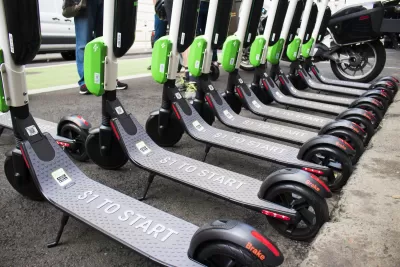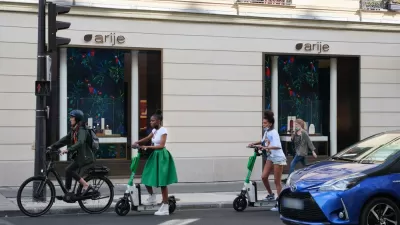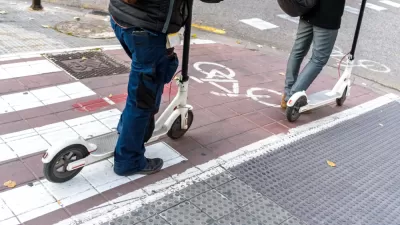Major micromobility comapnies and lesser known competitors are stating their interest to take part in a New York City e-scooter pilot program slated for Spring 2021.

New York City Department of Transportation (NYCDOT) recently released a Request for Expressions of Interest (RFEI) for the city's eagerly awaited e-scooter pilot program. "The RFEI announcement has now set off a frenzy among dockless vehicle operators, who all see an opportunity to serve what has, until now, been the largest untapped market in the United States," reports Chris Teale.
U.S.-based companies like Bird, Lime, and Spin are preparing applications to participate in the pilot program which will begin on the first of March next year.
Once initiated, the pilot program will be rolled out the vehicles in small groups to ensure safe service sin all every borough except Manhattan, where e-scooters will not be permitted. "NYCDOT said that preference will be given to serving areas outside of its existing or planned bike-share zones," says Teale.
All of the microbility corporations who commented for Teale's piece said that safety and equity would be among their top priorities in planning for the pilot and completing the application process. Elected officials cited safety and charging infrastructure as their main concerns in provisioning the e-scooters. The RFEI specifies that operators will be responsible for making sure scooters are properly parked. Additionally, operators will not be allowed to hire private contractors to charge vehicles in private residences.
Competing with the major micromobility companies are Stockholm-based Voi and the robotics company Superpedestrian. All companies have been asked to complete their applications by a December 16th deadline.
FULL STORY: NYC releases terms of e-scooter pilot

Planetizen Federal Action Tracker
A weekly monitor of how Trump’s orders and actions are impacting planners and planning in America.

Map: Where Senate Republicans Want to Sell Your Public Lands
For public land advocates, the Senate Republicans’ proposal to sell millions of acres of public land in the West is “the biggest fight of their careers.”

Restaurant Patios Were a Pandemic Win — Why Were They so Hard to Keep?
Social distancing requirements and changes in travel patterns prompted cities to pilot new uses for street and sidewalk space. Then it got complicated.

Platform Pilsner: Vancouver Transit Agency Releases... a Beer?
TransLink will receive a portion of every sale of the four-pack.

Toronto Weighs Cheaper Transit, Parking Hikes for Major Events
Special event rates would take effect during large festivals, sports games and concerts to ‘discourage driving, manage congestion and free up space for transit.”

Berlin to Consider Car-Free Zone Larger Than Manhattan
The area bound by the 22-mile Ringbahn would still allow 12 uses of a private automobile per year per person, and several other exemptions.
Urban Design for Planners 1: Software Tools
This six-course series explores essential urban design concepts using open source software and equips planners with the tools they need to participate fully in the urban design process.
Planning for Universal Design
Learn the tools for implementing Universal Design in planning regulations.
Heyer Gruel & Associates PA
JM Goldson LLC
Custer County Colorado
City of Camden Redevelopment Agency
City of Astoria
Transportation Research & Education Center (TREC) at Portland State University
Camden Redevelopment Agency
City of Claremont
Municipality of Princeton (NJ)





























